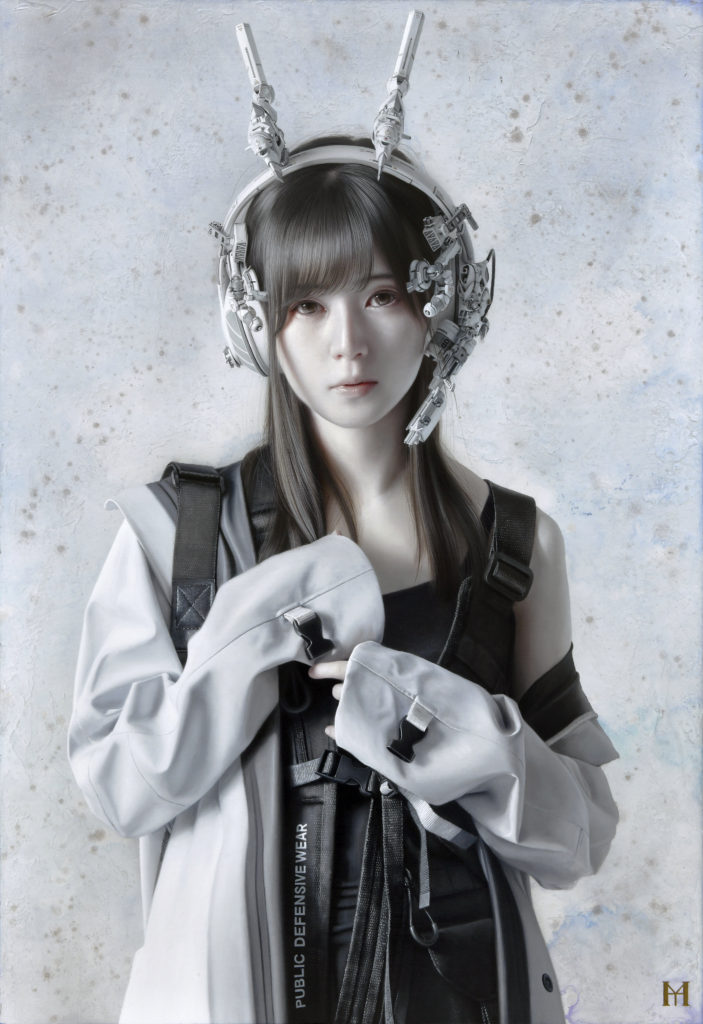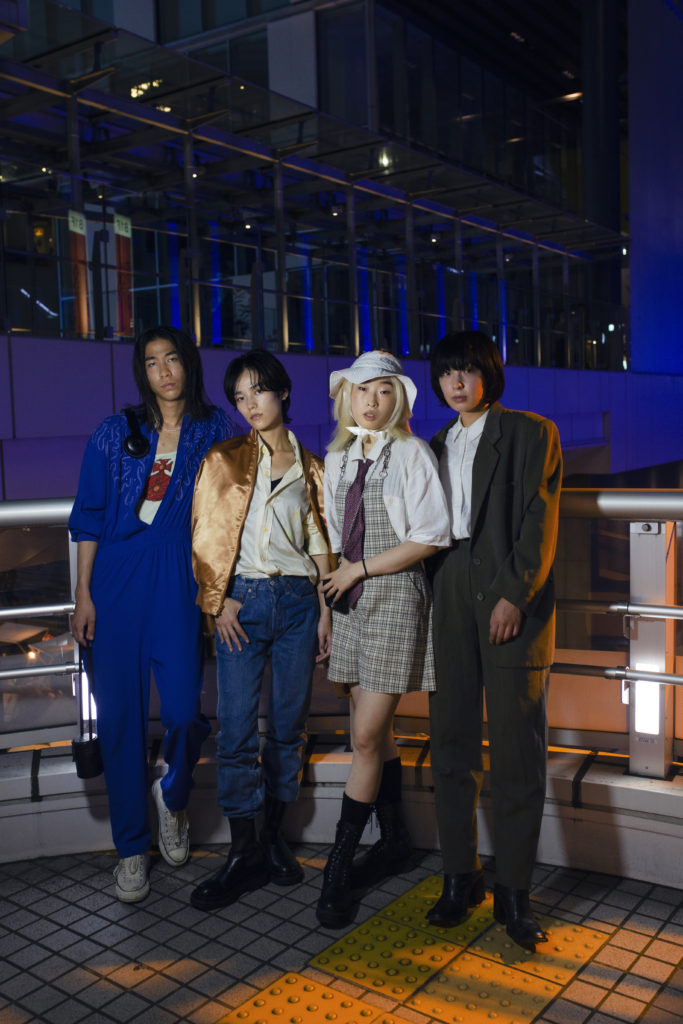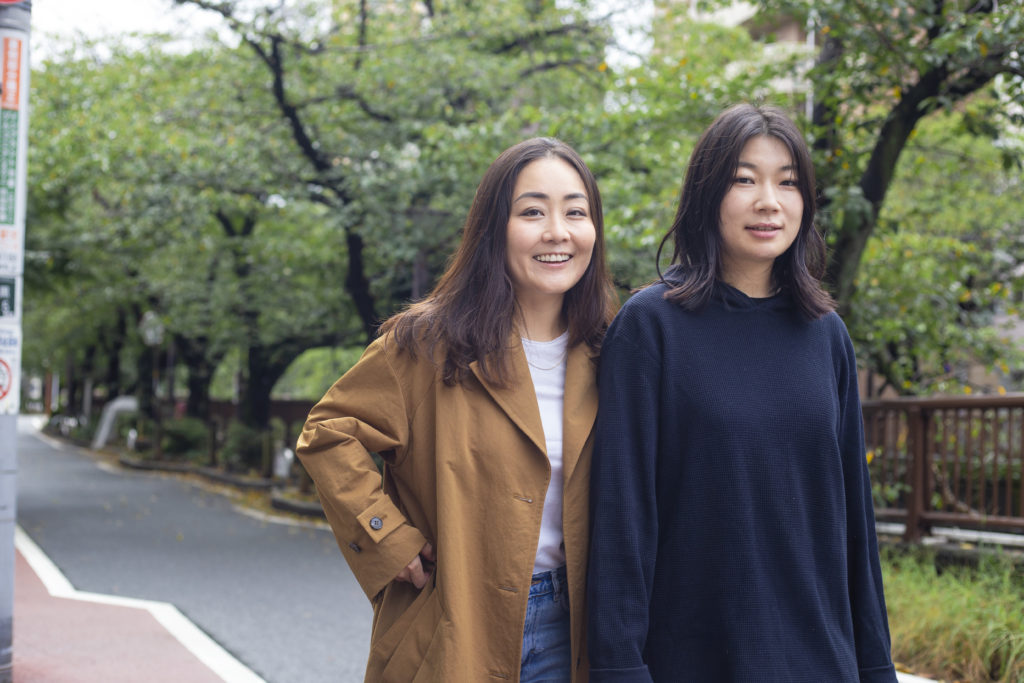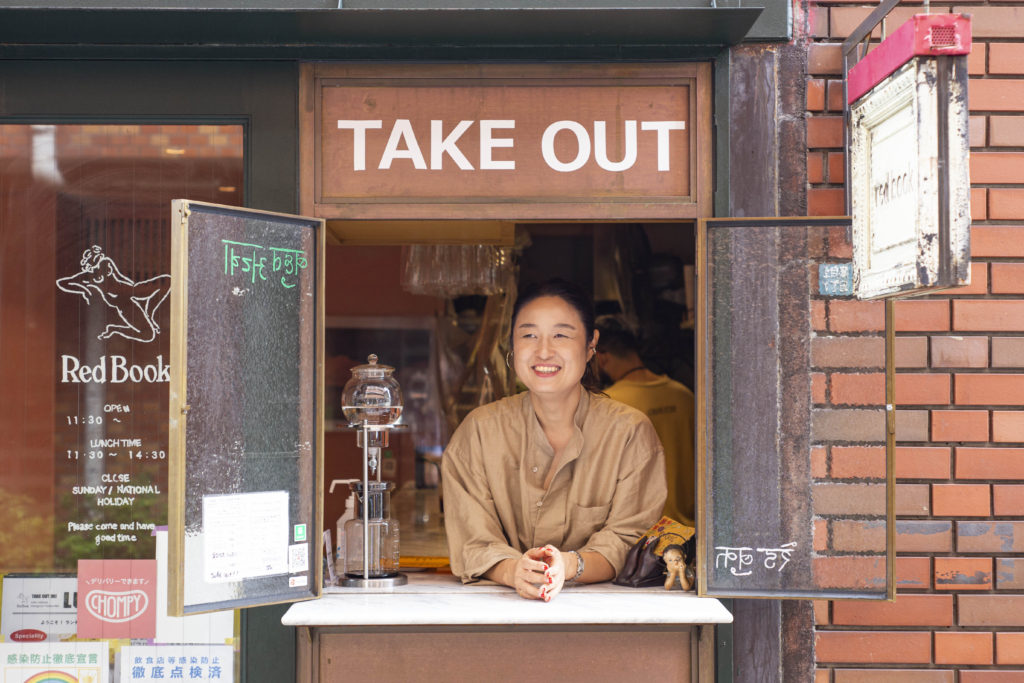

私が、神コスプレイヤーを描く理由とは?

Your Neighborhood – INTERVIEW with BELLONA MODEL AGENCY

Your Neighborhood – INTERVIEW with SAYORI WADA & SHIOMI WADA

Text/Translation: Yuka Shimayoshi
Photo: Magnus Bach
まず、今回のアルバムについて教えていただけますか。ずばり、コンセプトはなんでしょう?
僕たちが曲を作るときは色んな曲をたくさん作るし、インスピレーションはあらゆるところから湧いてくる。このアルバムでは、僕たちの人生の様々に異なったムードやスタイルに目を向けたアルバムを作りたかった。First Hateのサウンドは互いに組み合わさったり引き立たせたりすることでどのような音になるのかという結果を示すものにしたかったんだ。いろんな花で作られたブーケを見るようにね。
それに加えて、作品が作られた環境や周囲の友人たちを反映したサウンドで構成し、僕たちの日常的なサウンドスケープを記録したものにすることも大切だった。音の家族写真集みたいに。イントロや間奏、それからいくつかの曲中に、友達が喋っている声や階段を下りていたり楽器を鳴らしていたりする音……そういった友達とか彼女、元カノ、それからアントンの猫の声やサウンドが聞こえるはずだよ。
“A prayer for the unemployed”は宗教的な言葉のようですが、どうしてこれをアルバムタイトルに決めたのでしょうか?
アルバム用の曲を作り始める直前に、友達のDeeと教会の前でぶらぶらしていたら、彼女がもっと若いころに教会に忍び入って、”A Prayer For the Unemployed”っていうお祈りが書いてあるラミネートシートを盗んだことを話してくれたんだ。もともとのお祈りは文字通り職に就けずに苦しんでいる人たちへのものなんだけど、僕たちが興味深いと思ったのは、雇用対非雇用の対立を前提としていること、そしてそういう視点を持つことでいかに多くの人が罠にはまったように感じているかということに誰も疑問を抱いていないというところだった。僕たちの祈りは、人生の中で自分の居場所を見つけるのに苦労しているみんなのための祈りだ。人生の中で自分の居場所を見つけるのに苦労しているみんなのための祈り。
この曲に関しては、まず音楽と雰囲気が最初に浮かんできたんだ。これを作ったとき、コペンハーゲンの夜が映画のシーンのようにありありと浮かんできて、雰囲気を作り出すイントロにぴったりの、カップルが喧嘩している場面の会話まで想像できた。このサウンドは僕たちに青春時代と心の痛み、ナイトライフを思い出させたよ。生まれ育った街の夜を切り取りたかった。
永遠に存在するようで、同時に、果てしなく退屈させるようなところなんだ。それはこの曲にも少し表れている。
アルバムを通して、間違いなくダンスミュージックでありながら、ロマンティックでドリーミーなサウンドを奏でていますよね。この音楽性にはどのようにしてたどり着いたのでしょうか?
ときには音楽でなにか決まったことを達成しようとすることもあるけれど、いつも全く違ったところに落ち着くんだ。僕たちにとって曲作りはかなり直感的なもので、最終的にどこへたどり着くのか一度も本当に分かったことはない。たいていはMacBookでMIDIのサウンドとサンプルを使って曲を作っていって、最後の方でチェロやピアノ、ベースなどの実際の音を決まった箇所に付け加えることもある。こういった楽器の温かさはPCではシミュレーションできないと思うところにね。曲を作っている場所や時間が音楽の表現に影響することもよくある。真夜中に曲を作っていて隣で人が眠っているとしたら、レコーディングするときほとんど囁いてヴォーカルを入れなきゃいけないだろう、そうすると音楽の性質として雰囲気がナチュラルなものになる。たとえあとでレコーディングし直したり変えてしまったりしてもね。
このアルバムのサウンドを形作るのに役立ったものの一つは、ほとんどの曲に使ったサンプリングした楽器だ。特に、アリアナ・グランデの声からサンプリングして、キーボードとして音を合わせたものは何らかの方法でほとんどの曲に使われているよ。
2013年に初めて曲を発表してからおよそ4年経っていますね。この4年間はアルバム制作の過程にどう影響しましたか?
4年の間にほんとうにいろんなことが起こって、いつも様々なことを学んだよ。まだ曲作りに関して全く慣れていないように感じているし、ほとんど新参者のような気持ちでいるんだ。音楽的な教育やスキルはまったく持ち合わせていないけれど、自分たちが持っているものはなんでも使ってみようといつも試みている。問題は人格や人生を曲の中に落とし込むこと、それから自分たちが正しいと思うことをやるということ。どうやって書かれたか、演奏されたか、ミックスしてプロデュースしたか、iPhoneでレコーディングしたのかミスがあるのか、そういったことは全く関係ない。
お二人のことを聞かせてください。それぞれそのような役割を担っているのですか?
僕たちは陰と陽、双子の兄弟、姉妹、両親、子ども。全部一緒にやってアイディアを共有して曲を作っている。ときどきツアー中に、君たちは付き合っているのかいと聞かれて、どれだけ多くの時間を一緒に過ごしているのか気づかされるんだ。
IceageやCommunionsなどなど、最近多くのコペンハーゲン出身のバンドが日本をはじめ世界中で人気を集めていますよね。デンマークの音楽シーンについてどのように考えていますか?この人気の理由はなんでしょう?
見当もつかないよ。でも近しい友人たちの多くが世界中に彼らの音楽を広めて成功しているのを見るのはとても嬉しいことだね。彼らの行動や成功を見ていると、みんなのやっていることをインスパイアしてくれるし、音楽を作っている友人を持つこと、あるいは互いにショーの計画を手伝ってできることは音楽を仕事にすることをもっと身近にするだろう。僕たちはデンマークの音楽シーンの魅力なんて分からないんだけど、じゃあいったい誰が分かるっていうんだ? 僕たち自身の魅力はいろんなところに表れているよ。夢と冒険に溢れた島である日本みたいにね。二人ともマンガを読んだりアニメを見たりして育ったんだ。日本食を食べて日本のものすべてに執着していたんだよ、日本とデンマークの素晴らしいつながりを持つためにね!
では、あなたたちのアルバムを聴いてくれる人へのメッセージはどういったものでしょう?
僕たちのアルバムは口に出して言いたいような、ある決まったメッセージを必ずしも含んではいないけど、僕たちの曲が人々の心や頭の中に居場所を見つけて、彼らの寂しさを小さくできたらと願うよ。音楽を通して経験や人生についてよく思案することは、人々の視野を広げ、最終的には自己の肯定と他人との共通点や相違点を認めることにつながると思う。
最近はヨーロッパをツアーで回っていますね。日本など、他の地域に行く計画はありますか?
もちろん! 去年は中国でツアーを回って、今年はもっとアジアを訪れられたらいいなと思っているんだ。First Hateとして日本に行くことはつねに僕たちの大きな夢の一つだからね、そう遠くない将来に行けるんじゃないかという気がしているよ……!
First Hate
デンマーク出身のJoakim Nørgaardと Anton Falckによるデュオ。2014年にリリースしたセルフタイトルEP『First Hate』から「Girls In The Club」と「In My Dreams」がヒット。コペンハーゲンのアンダーグラウンドシーンを反映したジャンルを超えた音楽が話題となる。2017年春、待望のデビューアルバム『A Prayer For The Unemployed』をEschoからリリース。
First, could you tell us about the new album? What is the concept behind it?
When we make music we make a lot of very different songs and our inspirations come from all over the place. With this album, we wanted to make an album with a view into some of the different styles and moods of our life. We wanted the sound of First Hate to be the result of how the songs would sound when combined or complementing each other, like looking at a bouquet of different flowers.
On top of that, it was important for us to fill the record with sounds of our friends and the environment that the record was made in and to document our daily soundscape. Like a sonic family photo album. In intros, interludes and some songs you can find voices and sounds of friends speaking, walking down the stairs, playing instruments…… friends, girlfriends, ex-girlfriends and Anton’s cat.
I learned that “A Prayer For the Unemployed” is a religious word. Why did you decide the title on this?
Right before we started making songs for the album, we were hanging out in front of a church with our friend Dee and she told us of the time where her younger self had broken into a church and stolen a laminated sheet with a prayer saying “A Prayer For the Unemployed” The original prayer is literally for people struggling with unemployment, but what we found interesting was that no one was questioning the premise of employment versus unemployment, and how living within that perspective makes so many people feel trapped. Our prayer is a prayer for everybody struggling with finding their place in life. A prayer for everybody struggling with finding their place in life.
There’s a song called Copenhagen, which is the first single of the album and about your city. Why did you make this song?
The music and the atmosphere of this track came first. When we made it we had film scenes from a night in Copenhagen running before our inner eyes and even had a dialogue with a couples love argument as an intro to set the mood. The sounds reminded us of youth, heartache and nightlife. We wanted to capture a moment from the city we grew up in.
A place that feels endlessly exiting and endlessly boring at the same time. A little bit like this song.
Through the whole album, it is definitely a sound of dance music, but at the same time it sounds romantic and dreamy. How did you reach this kind of sound?
Sometimes we try to achieve certain things in our music, but we always end up in a totally different place. For us, making music is a very intuitive process and we never really know where we are going to end up. We make the music on our MacBook using mostly MIDI sounds and samples, and then very late in the process we might add real instruments like cello, piano or bass at certain places where we feel the warmth of those instruments can’t be simulated. Often the place and time you’re making a song in affects the song expressions. If you’re making a song in the middle of the night and people are sleeping next to you, so you have to almost whisper the vocals while recording them, that mood will become a natural part of the songs nature, even if you later on re-record the vocals or change them.
One thing that helps shape the sound of this album is the sampled instruments we have used on most of the songs. Especially one instrument that we made from sampling Ariana Grande’s voice pitching it as a keyboard is used on most of the songs in one way or the other.
You dropped the first song off in 2013 and it’s been about 4 years now. How these 4 years affected to your process of making the album?
Lots of stuff have happened the last 4 years and we learn a lot all the time. We still feel like we are totally new to making music, and we often feel like total newbies most of the time. We have no musical education or musicians skills but we always just try things and experiment with whatever we have. It is a matter of putting personality and stories into sounds and just doing what you feel is right. And then it doesn’t matter how it’s written, played, mixed, produced or whether it’s iPhone recordings or mistakes.
Let me ask about you two. What role does each of you play in the duo?
We are yin and yang, Twin brothers, sisters, parents, kids. We do everything together and share ideas and make the songs together. Sometimes on tour we’re reminded of how much time we spend together by people asking us if we’re a couple.
These days many bands from Copenhagen are very popular in Japan as well as over the world. For example, Iceage, Communions and so on. What do you think of the music scene in Denmark? What is the reason for this popularity?
We have no idea. But for us it is very nice to see so many of our close friends have success with taking their music all over the world. Watching friends’ actions and achievements helps inspire the things you do and having friends that make music, or helping you each other with setting up shows, makes playing music seem much easier accessible. We don’t know what the fascination about the music in scene in Denmark is though, who knows? Our own fascination lies elsewhere. Like in Japan, that to us seems like a land of dreams of adventures. We both grew up reading manga watching anime. Eating Japanese and really obsessing over everything Japanese so to have a connection between Japan and Denmark like that is golden!
And what is your message you want listeners to know in the album?
Our album doesn’t necessarily contain one clear message that we want to get out, but we hope that our songs can find a place in people’s heart and minds and make them feel less lonely. We think that reflecting on ones live and experiences through music can broaden ones perspective and in the end be leading to acceptance of oneself and embracement of others for their differences and similarities.
You currently go on a tour around Europe. Do you have a plan to go to different regions like Japan?
Of course! We’ve been on tour in China last year and this year we hope to be able to visit more of Asia. Going to Japan with First Hate has always been one of our biggest dreams, and we have a feeling that it won’t be too long now……
First Hate
Danish duo, Joakim Nørgaard and Anton Falck. The journey continues for First Hate. It all began with the self-titled debut EP ‘First Hate’ (Bad Actors Inc., September 2014), which featured hit singles “Girls In The Club” and “In My Dreams”, music that transcended genres transforming the Copenhagen underground scene. Spring 2017 saw the release of their highly anticipated debut album ‘A Prayer For The Unemployed’, which was released via Escho.



